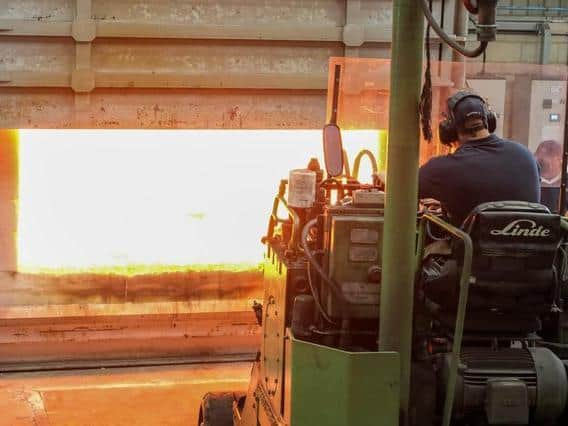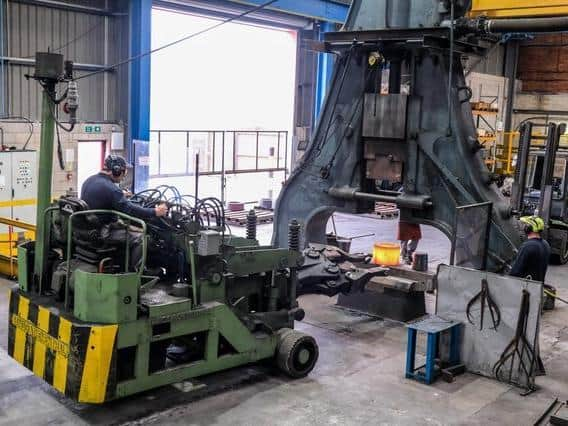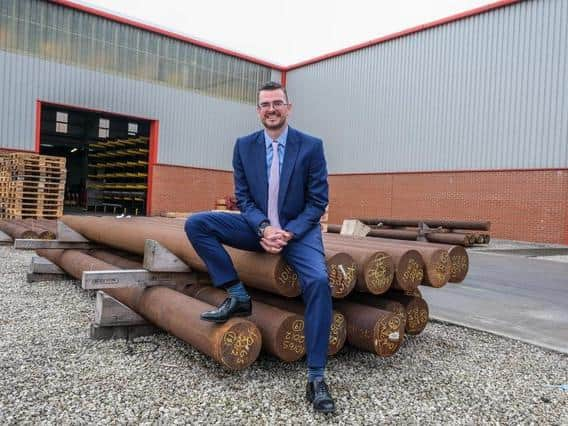The Yorkshire steel firm which says it hasn't made a loss for almost 100 years
It is part of the Special Steel Group founded in Sheffield in 1925, which says it has always been in profit.This astonishing claim covers a world war, the endless boom and bust cycles of the oil and gas industry and all manner of economic and social upheavals - not least erecting trade barriers against our biggest market during a pandemic.
Bennett Beardshaw is great-grandson of the founder – and has the same name – and is managing director of the alloys division.
Advertisement
Hide AdAdvertisement
Hide AdHe said business was ‘hand to mouth’ at the beginning of this year and they still face multiple challenges. But all the buildings and equipment are ‘bought and paid for’, including a £5m forge - a hammer, two furnaces and a ring roller - installed two years ago.


And while the near 100 years of profitability bring a certain weight of history, he wasn’t facing it alone.
His dad Alan is group chairman, his brother is on the heat treatment side and several long-serving board directors ‘bring stability’.
He said: “We are ambitious but we have always done it within ourselves.”


Advertisement
Hide AdAdvertisement
Hide AdSpecial Quality Alloys is based in the Continental Steel Works on Bessemer Road in Attercliffe.
It makes bespoke components from alloys of steel, which might include nickel, chromium or niobium for strength and corrosion resistance, and used in equipment hundreds of feet under the sea, or in space.
In the new forge, red hot alloy steel rings were being removed from a furnace and placed on a 65-tonne anvil and hit with a 3.5 tonne open-die forging hammer.
The ground shakes, despite foundations 15ft deep, and the noise is literally deafening without earplugs.


Advertisement
Hide AdAdvertisement
Hide AdThe surprising responsiveness of the hammer is explained by an industrial scale compressed air system that includes two big tanks outside and an 11,000 volt transformer.
The rings are then whisked over to the ring roller which makes short work of expanding them further. Finally, the still-glowing components are deposited on the foundry floor and stamped with a mark of origin by a man with a sledgehammer. Ultimately they will form part of a subsea valve assembly.
Mr Beardshaw said the process still gave him a thrill.
He added: “I’m mesmerised by the power and the energy. The heat coming off it and the forces going into it.”
Sales engineer Shane Higgins said he was proud of the finished products, which are exported to 37 countries.
Advertisement
Hide AdAdvertisement
Hide Ad“I think it’s a Sheffield thing. We’re not selling tins of beans. These are niche products for critical applications.”
Detailed dot-matrix marking and records of melting, grain size and ‘cleanliness,’ are added later.
Mr Beardshaw added: “We say we sell as much paperwork as metal.”
Despite being out of favour due to environmental concerns, the oil and gas market comprises up to 85 per cent of the firm’s business.
Advertisement
Hide AdAdvertisement
Hide AdMr Beardshaw says some of his customers have been closing facilities and moving to ‘better cost’ countries.
Yet the UK doesn’t have enough renewables to cope with demand - especially on calm days - and is dependent on gas from thousands of miles away.
He added: “There’s a level of frustration. We have the infrastructure here. There are gas sites off the Shetlands. How can it be greener to bring it in from Russia?”
Soaring gas prices could force them to put up prices, he added.
Advertisement
Hide AdAdvertisement
Hide AdMeanwhile, two HGV drivers had just had a pay rise to encourage them to stay, amid spiking demand due to a 100,000 shortfall.
The European Union is a third of trade. But Brexit had caused delays and disruption and new paperwork and costs.
Mr Beardshaw added: “Every turn we take seems to be increasing costs. We are among the Sheffield manufacturers exporting all over the world. Government has got to support us but at the moment the industry feels unloved.”
It’s easy to imagine Mr Beardshaws’ great-grandfather listening attentively and nodding - for he started his career in this very building.
Advertisement
Hide AdAdvertisement
Hide AdIn 1906, Bennett Beardshaw started as a junior accounts clerk at renowned steel firm Jonas and Colver.
Established in 1870, it became one of the largest manufacturers of high-speed steels used in tool making. By 1906, it employed 2,500 people at the Continental Steel Works.
After 18 years with the company Mr Beardshaw suggested it should venture into the heat treatment business. But his bosses were unconvinced and, so the story goes, he was invited to leave.
In May 1925 he set up Special Steel Co Ltd half a mile away on Bacon Lane. It is still the site of the group’s parent company.
Advertisement
Hide AdAdvertisement
Hide AdDemand for his two treatment furnaces and quench tank quickly became overwhelming and the company added buildings and furnaces in the 14 years leading up to the Second World War.
Bennett’s son Douglas joined the company from the English Steel Corporation and a new division, Special Testing Works Ltd, was formed.
In 1971 a new hardening and tempering department was built. Mr Beardshaw senior instigated and oversaw the project, working six days-a-week at the age of 84.
Special Quality Alloys was established in 1986. In 2014 it moved into the recently-vacated Continental Steel Works, where the founder started work more than 100 years before.
The works were renovated and many original features remain today in a building steeped in Sheffield’s industrial history.
